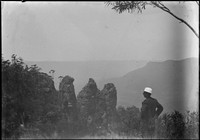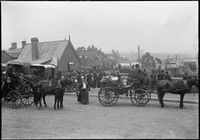 Loading... Please wait...
Loading... Please wait...
Store Navigation
- Home
- Archival prints
- Katoomba from atop a pole, 1903
Product Description
Vaniman's antics to take this photograph were described in the Blue Mountains Gazette 27 November 1903: 'A man at the top of an eighty-foot pole attracted a deal of attention in the Katoomba Park on Wednesday [as he] coolly handled a photographic camera with which he took several pictures.' Recently restored, The Carrington Hotel continues to overlook the town and Jamison Valley.
Chester Melvin Vaniman was born to a farming family in Illinois in 1866, the eldest of four sons. His formative years on the farm gave him a lifelong interest in agriculture and experience with all sorts of machinery. Nevertheless, he studied music at Valparaiso University in Indiana and later in Chicago. He became a music teacher in Iowa, before joining a touring opera company in Louisiana in 1887 and singing his way through virtually every state of America (‘except two – Florida and Maine’). It was during his eleven year singing career that Vaniman developed an interest in photography, recording the towns he visited. The opera company dissolved after a financially disastrous tour of Hawaii during a plague scare. Around 1900, he married hometown sweetheart Ida Loud in Honolulu and spent two years as an electrician, before trying photography as a profession in Hawaii in 1901. Vaniman’s unusual panoramas caught the eye of the Oceanic Steamship Company, which commissioned him to photograph places visited by their vessels in New Zealand and Australia, as an incentive for tourists. Vaniman arrived in Auckland in 1902 and spent a year photographing both islands, not only for the company, but also for the New Zealand government, who wanted his spectacular images to encourage tourism. The New Zealand Free Lance described his panorama of Auckland as ‘a poem that will run into several editions, and take a good deal of wall space to give it effective exhibition’. Nevertheless, his trans-Tasman photographs were mostly a precursor to the larger and technically superior panoramas he produced in Australia.
He reached Sydney in February 1903 and spent a year, on and off, photographing the city. He described it as his favourite place in Australia: ‘... my chief love in this country is Sydney. I am very fond of it; its residents and – of its climate’. Journeys were made to Melbourne in November 1903 for the Melbourne Cup, the Blue Mountains later in the month and to the central west of NSW during December to photograph the record wheat harvest, which impressed the agriculturalist in Vaniman greatly. He travelled the New South Wales coast between Nowra and Newcastle, with excursions as far afield as Cairns and Rockhampton in Queensland; and Hobart, Launceston and Queenstown in Tasmania.
Vaniman was a photographer with a head for heights. His panoramic photographs were nearly always taken from high above the ground and if a nearby building or ship’s mast was not at hand, he erected his own 30 metre pole to achieve a bird’s-eye view. His antics atop a pole in Katoomba Park in 1903 earned him the nickname ‘the acrobatic photographer’. When his trusty pole didn’t give him the height necessary to photograph the entire city of Sydney in a single sweep, he imported a balloon from America and spent months tethered 180 metres above North Sydney, experimenting with the new perspective. Vaniman even built his own camera, able to record panoramic views on film up to two metres in length and 50 cm wide in a single shot, to utilise the higher viewpoint. He had always intended that his panoramas be seen as massive enlargements up to five metres long, but none are known in that format. Fortunately, the majority of Vaniman’s panoramas survive as platinum prints, contact printed from the original negatives. These prints were expensive to produce and required exposures of between two and four hours in sunlight to produce, but their longevity and exquisite tonality have made Vaniman’s persistence with the technique worthwhile.







